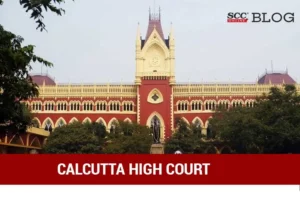Calcutta High Court: In an application under Article 227 of the Constitution of India against the impugned order rejecting the petitioner’s prayer for the rejection of the plaintiff’s complaint under Order 7 Rule 11(a) & (d) of the Code of Civil Procedure, 1908 (CPC), a single-judge bench comprising of Ajoy Kumar Mukherjee,* J., held that the lower court’s decision to reject the petition’s application was not perverse, and the lower court did not overstep its jurisdiction.
The Court dismissed the application under Article 227 of the Constitution of India with the observation that the present order would not prevent the petitioner from challenging the maintainability of the suit at an appropriate stage of the proceeding.
Factual Matrix
In the instant matter, the plaintiffs initiated a suit against the defendant, seeking a declaration that plaintiffs are the shebaits of the deity in question under the terms of a registered deed of Arpanama dated 19-05-1928. Additionally, plaintiffs sought a declaration that an ex-parte decree obtained by the defendant, which removed plaintiffs from shebaitship, is void and not binding on them. The plaintiffs also requested a permanent injunction against the defendant to prevent interference with their possession of the suit’s property.
The defendant filed an application for the rejection of the plaintiffs’ complaint under Order 7 Rule 11(a) & (d) of the CPC, contending that the plaintiff had not provided the necessary particulars of fraud in the complaint as required by Order 6 Rule 4 of the CPC. The defendant argued that the complaint suffered from non-disclosure of facts constituting a cause of action and that the plaintiff had not explained why the defendant, in their personal capacity, was involved in the matter.
The lower court vide order dated 31-07-2019, determined that the complaint clearly disclosed a cause of action. The court found that there was no indication in the complaint that the suit was barred by any law, and therefore, neither Order 7 Rule 11(a) nor Order 7 Rule 11(d) will be applied. Consequently, the lower court rejected the defendant’s application.
Aggrieved by the impugned order dated 31-07-2019 passed by the Civil Judge (Senior Division), Bankura, the petitioner (the original defendant) preferred an application under Article 227 of the Constitution of India challenging the same.
Parties’ Contentions
The petitioners contended that all shebaits are necessary parties in a suit involving a deity as the owner of the property and the failure to implead them renders the present suit for declaration of shebaitship legally barred. It was contended that the lower court failed to properly consider the non-disclosure of a cause of action and the petitioner’s personal interest in the Debuttor property. It was further contended that even if a decree is granted as prayed for, it would not bind the petitioner or the Debuttor estate since the deity had not been impleaded as a party/defendant.
The respondents (the original plaintiffs) contended that the complaint clearly described how the ex-parte decree was obtained through fraud upon the court. It was contended that, for the purpose of deciding the application, the court should read the entire complaint as a whole and determine whether it discloses a cause of action.
Court’s Assessment
Regarding the application under Order 7 Rule 11(d), the Court emphasized that it should only determine whether the suit is barred by any law based on the allegations in the complaint, assuming those allegations to be true. The Court found no grounds to conclude that the suit was barred by any law, emphasizing that strict adherence to the conditions in Order 7 Rule 11 is necessary due to the drastic nature of rejecting a complaint.
Concerning the application under Order 7 Rule 11(a), the Court stated that the Court should scrutinize the averments in the complaint to determine if the complaint discloses a cause of action. The Court emphasized that in the context of Order 7 Rule 11(a), the court should focus on substance rather than form.
In the present case, the respondents had averred in the complaint that the petitioner had obtained a fraudulent decree denying their shebaitship rights from 27-07-2018. The Court held that at this stage, it was not required to investigate the truthfulness of the allegations but only to assess if respondents disclosed a cause of action.
The Court held that the issues raised by the petitioners, such as the sufficiency of fraud particulars and whether the respondent could sue in their personal capacity, were mixed questions of law and fact to be determined during the trial. However, the Court found no merit in the petitioner’s application under Order 7 Rule 11.
The Court dismissed the present petition but clarified that this order did not preclude the petitioner from challenging the maintainability of the suit at the appropriate stage of the proceeding.
Court’s Decision
The Court upheld the lower court’s decision to reject the petitioner’s application under Order 7 Rule 11(a) & (d), finding no legal grounds for interference under Article 227 of the Constitution of India.
[Debashis Chakrabartty v. Bimal Chakrabartty, 2023 SCC OnLine Cal 3109, order dated 27-09-2023]
*Judgment by Justice Ajoy Kumar Mukherjee
Advocates who appeared in this case :
Ms. Shreya Trivedi, Counsel for the Petitioner
Mr. Aniruddha Chatterjee and Mr. Debabrata Roy, Counsel for the Respondents

